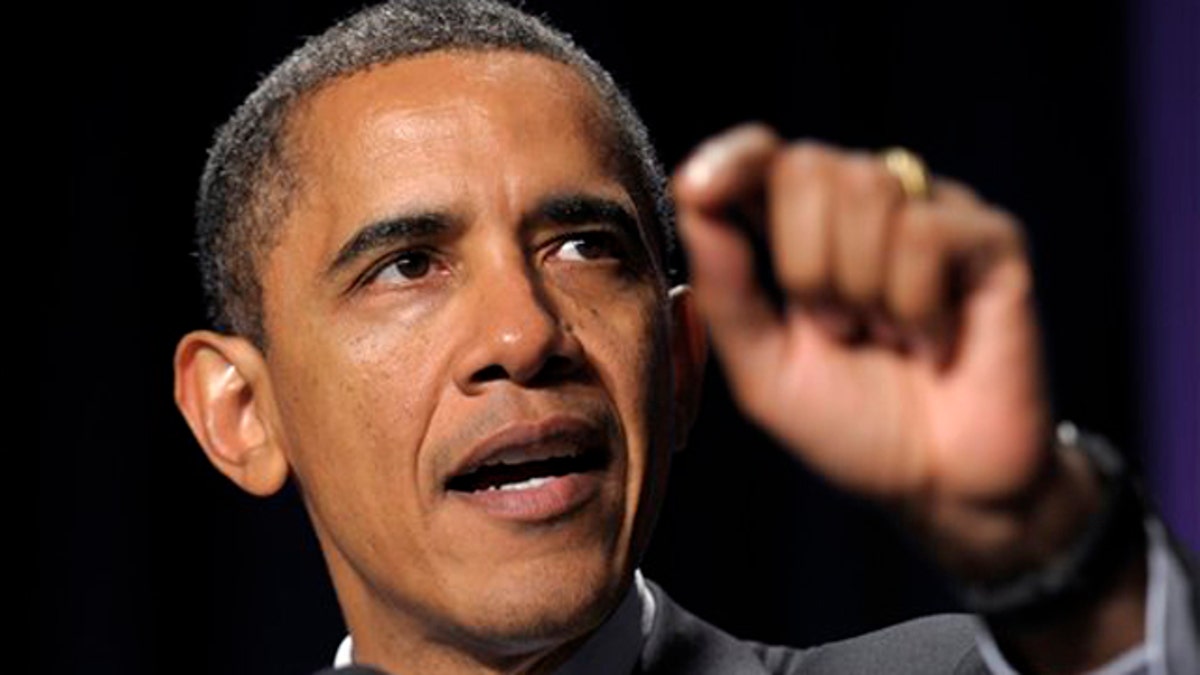
Nov. 9, 2011: President Obama speaks at the National Women’s Law Center’s Annual Awards dinner in Washington. (AP)
The Obama administration's decision to delay a controversial oil pipeline was cast by critics as a political ploy to placate environmentalists ahead of the 2012 election.
But if that's the strategy, it could backfire.
While the decision pleased environmentalists who had earlier suggested they might withhold support for President Obama over the project, it did not please the labor unions who were banking on the estimated 20,000 jobs tied to the pipeline.
And in a jobs election, the support of unions and business interests is arguably more critical than that of the green base.
Republican strategist Brad Blakeman said he was puzzled by the decision on the pipeline project -- diplomatically, politically and economically.
"The reasons not to do it are far outweighed by the reasons to do it," he said. "It doesn't make any sense to punt it until after the election, when you could have a victory on numerous levels today."
The president and his team were in a tough spot with the Keystone XL pipeline. On one side, unions were clamoring for jobs. On the other, liberal activists warned of the health and environmental impact of the pipeline and were protesting in large numbers near the White House.
In the end, the administration gave a nod to the latter. But at least one GOP candidate -- former House Speaker Newt Gingrich -- suggested the decision would not win many political points next year.
"Only days after we learned that at least 9 percent of Americans were unemployed for the 30th straight month, the president has made a decision that will only prolong this suffering," Gingrich said in a statement.
Threatening to make the pipeline a wedge issue in 2012, he vowed to "approve this project on the first day of my administration in 2013."
Critics of the administration's call were not shy about expressing their disappointment. The decision marked the rare occasion where congressional Republicans and labor unions were united, along with the business community.
"The administration chose to support environmentalists over jobs -- job-killers win, American workers lose," Terry O'Sullivan, president of the Laborers' International Union of North America, said in a written statement.
"By punting on this project, the president has made clear that campaign politics are driving U.S. policy decisions -- at the expense of American jobs," House Speaker John Boehner said.
The Chamber of Commerce chimed in with a similar lament.
Administration officials, though, deny politics was in any way at play.
"This is not a political decision. We have been ... out there as listening to what the public has to say," said Kerri-Ann Jones, an environmental official in the State Department.
The 1,700-mile pipeline would extend from Canada to the Gulf of Mexico. Jones cited key concerns about its route near the Nebraska Sandhills region and a major aquifer. The State Department decision would compel the Canadian company TransCanada to reroute the pipeline around those sensitive areas.
A new environmental review would likely push off any decision until 2013, after next year's elections.
Obama, in a written statement, described the decision as the State Department's call, and expressed support for it.
"We should take the time to ensure that all questions are properly addressed and all the potential impacts are properly understood," Obama said, citing "health and safety "concerns, as well as environmental concerns.
Environmentalists applauded the decision. Friends of the Earth President Erich Pica called it a "major accomplishment for the climate movement" and for the people who could be affected by the pipeline route.
Rep. Henry Waxman, D-Calif., ranking Democrat on the House Energy and Commerce Committee, praised the State Department for recognizing the problems with the pipeline, and described tar sands as "the dirtiest, most carbon-polluting oil available."




